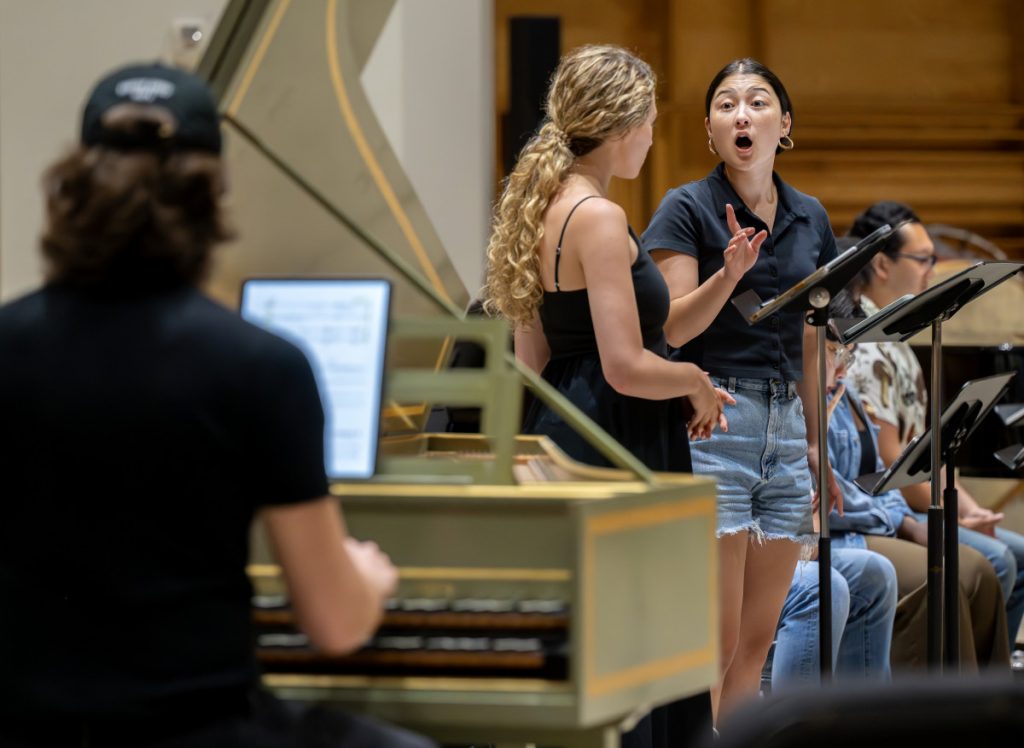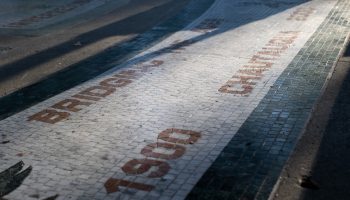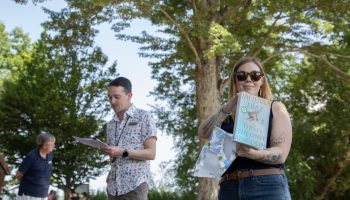Liz Delillo
Staff writer
Deciding whether to watch an opera or a sitcom just got a little easier.

In a double-bill workshop presentation to serve as the finale of its 2025 season, Chautauqua Opera Company will present the chamber operas Ida by Lamplight and Sitcom at 3:15 p.m. today in Elizabeth S. Lenna Hall.
Ida by Lamplight is a 20-minute work drawn from librettist Jerre Dye’s The Summer Place, an anthology tracing Chautauqua Institution’s history, commissioned by the Chautauqua Opera Guild. It will be the first workshop presented this afternoon, with a cast of Chautauqua Opera Young Artists Lindsey Weissman as Ida Tarbell, Kathiana Dargenson as Kate Kimball, Rosamund Dyer as Mrs. McNeil, Victoria Lawal as Mrs. Talbot and Seoyong Lee as Vincent.
Jeremy Gill is composer for Ida By Lamplight. A composer, conductor and pianist with works ranging from dramatic reworkings to orchestral music, including concertos, tone poems and symphonies, Gill has served as composer-in-residence with Chautauqua Opera, Harrisburg Symphony Orchestra and Newburyport Chamber Music Festival. Recent premieres include Tout le monde à la fois, Corvus Mythicus, Motherwhere: Bagatelles for Strings, after Bán and Concerto d’avorio, a four-hand piano concerto that premiered with the Chautauqua Symphony Orchestra in 2019.
Dye is a librettist and playwright dedicated to bringing new works to operatic and theatrical stages, and he received the Award for Dramatic Literature from the Fellowship of Southern Writers. His operatic works include the upcoming Taking Up Serpents, The Transformation of Jane Doe, Pretty Little Room and Woman with Eyes Closed. Dye began working on The Summer Place in 2016 with Steven Osgood, general and artistic director of Chautauqua Opera Company.

Chautauqua Opera Company Studio Artist Lindsey Weissman, mezzo-soprano, rehearses under the baton of General and Artistic Director Steven Osgood for her role as Ida Tarbell in Ida by Lamplight Thursday in Elizabeth S. Lenna Hall.
Dye has a history of interview-based work in opera, he said, and that’s how he approached his work for Ida by Lamplight.
“For about a week, I sat in Bestor Plaza and many other places and did everything from accost people and ask questions to just eavesdrop and get a sense of the place,” Dye said. “It’s a peculiar place, right? It has its rhythm, and it has its own identity, and it certainly has its own history.”
He returned to Chautauqua the following winter to continue researching this storied institution, spending significant time in the Oliver Archives Center.
“I did some research, and I found some of everything from pieces and parts of letters and excerpts, even imagery and even some visual recordings of old footage, which was pretty amazing, if you haven’t checked it,” Dye said. “I always tell people, go to the archives — check it out.”
All of those stories went into the shaping of The Summer Place, co-commissioned by Chautauqua Opera Company and Opera Memphis, with support from the Opera Guild. Two parts, A.E. Reverie and Love, Loss and the Century Upon Us, were performed in 2023 in Fletcher Music Hall, and then as part of Chautauqua Opera’s 2024 season, celebrating the Institution’s sesquicentennial. Last summer also saw a libretto reading of the entirety of The Summer Place in the Hall of Philosophy — including, for the first time, Ida by Lamplight, which this afternoon will be staged as a public piano reading.
The history embedded in Ida by Lamplight is central to the story. Tarbell contributed to The Chautauquan, a magazine published by the Chautauqua Literary and Scientific Circle, and The Chautauqua Assembly Herald, now known as The Chautauquan Daily. One of the goals of The Chautauquan was to expand CLSC membership.
Set in 1886, the opera imagines a late-night conversation between Tarbell and Kate Kimball, known as the “Mother Superior” of the CLSC, writing letters and reflecting on the program’s growing reach across America.
To this day, and to many, the CLSC is at the heart of the Chautauqua experience, and Dargenson noted how community members in the Opera Connections program have had parents, grandparents, and great-grandparents who graduated from the CLSC.
Through Dye’s libretto, Lawal interprets her character Mrs. Talbot as one of the people who felt their world expand because of education.
“She may have been someone who felt like there’s something missing in her life — and literacy and education filled that hole quite unexpectedly for her and opened up a whole new world for her to experience outside of married lives and regular obligations that they would have had as women at that time,” Lawal said.
Earlier in the 2025 season, Lawal was one of the artists who participated in the workshop of Lincoln in the Bardo. Though the operas themselves contrast starkly in many ways, Lawal found common ground between her characters in each.
“Similarly to living in the world of Lincoln and the Bardo and the world of Mrs. Hodge, it really reminds me of how far we’ve come as a society and how there are things like literacy, education, freedom of religion, freedom of speech, things that we can come to take for granted in the 21st century,” Lawal said.
Such historically oriented art informs not only present understanding of the past but also instills inspiration.
“Doing pieces that are very much so based around the genesis and the beginning of that movement and of that cultural shift, it really makes me feel grateful to be in the 20th century and have the rights that I have,” Lawal said.
Although the opera is based in history, producing the work alongside contemporaries reminds Dargenson how integral collaboration is to creating new works of art.
“There’s something really important about doing works from living composers,” Dargenson said. “… The idea of being in the room with people who have direct impact in the moment is really important to our careers, but I think it’s equally important for people to know that there are living works out there. There’s blood in the veins of this work, and we get to kind of leave our mark on that.”
Mixing the old with the new, Sitcom is a neo-baroque comic chamber opera workshopped by Chautauqua Opera. Sitcom, an hour-long excerpt from composer Luke Styles and librettist Alan McKendrick developed in collaboration with Opera Philadelphia and Producing Fund Partner Andrew Martin Weber, will be presented after (the more family-friendly) Ida by Lamplight. Chautauqua Opera has workshopped 60 minutes of the score this week in preparation for today’s public presentation.
As in sitcoms, the story follows four characters within the eternal present of their own worlds. Despite transformative journeys in each “episode,” they always return back to their status quo. The cast consists of soprano Kathiana Dargenson as Bettina, soprano Emily Finke as Joan, mezzo-soprano Lindsey Weissman as Vendetta, countertenor Chuanyuan Liu as Max and bass Robert Feng as the Bouncer.
Styles is a British-Australian composer who has composed the operas Fault Lines and Awakening Shadow and the song cycles No Friend But The Mountains and On Bunyah. He is also the artistic director of the Deal Festival, the 2022 British Council Musician in Residence to Brazil as well as the first Glyndebourne Young Composer in Residence. Additionally, he was the first composer-in-residence at the Foundling Museum since 18th-century Baroque composer George Frideric Handel.
Kendrick is a Scottish writer, director and translator who works across theater, film and opera. He wrote and directed an adaptation of Alexander Trocchi’s cult novel Cain’s Book, satire on weapons technology Finished with Engines, video-theater work The Mass Launching of Jawline Sabbatical and sci-fi jailbreak avant-rock musical Cadaver Police in Quest of Aquatraz Exit. Written projects include Ophelia, The Eye, All Howl at Once and Oh Graveyard, You Can’t Hold Me Always.
At the time of the earliest stages of Sitcom’s development, Styles was interested in Baroque music like that of Handel and Kavali.
“What I liked was not just the aesthetic and the color, but the freedom that writing recitative gives — to get closer to a kind of actor’s performance where they can pull it around, make it feel like it’s being lived in the moment for the first time every time you see it,” Styles said.
Sitcom’s Baroquean influence is not only found in musical notation but also the story’s thematic elements.
“People are always getting banished in Baroque opera — left, right, center,” McKendrick said. “Well, what would a modern banishment story look like?”
Rather than a typical Baroquean exile, Sitcom’s banishment is brought about through a nightclub bouncer.
With recitatives as the foundation, the music can flourish into many tones that suit the changes within the opera.
“Those models have the ability to go into formal arias and songs, which are highly crafted as well, so those two things were really attractive,” Styles said. “What those models also do is they move very quickly between something that’s absurd and comic, and then deeply, deeply heartfelt and tragic. I liked those shifts of gears, the freedom, as well as the chance to craft something very, very refined.”
With that kind of flexibility, Styles reveled in how rewarding workshopping the opera has been.
“The Young Artists have all really thrown themselves into it. They’ve brought a lot of energy,” Styles said. “The work is written to give them a certain amount of agency and freedom to play around with the vocal lines and to really draw out the characters, which are quite absurd, and maybe not cartoonish, but they’re quite big characters.”
Collaborating throughout the workshop was a highlight for singers, as well, as it allowed them to be creative within the process.
“Seeing everyone bringing their own acting chops and really just having fun in the playground and the sandbox with this opera, helps inform us,” Feng said. “The music informs us, and I think we also inform the music of how we can further create these characters — because we are creating these characters, possibly as the standard.”
Unlike workshopping an adaptation like Lincoln in the Bardo, singers play a more active role in originating characters.
“(Sitcom) is a concept and characters that have been burst completely from the minds of the composers themselves,” Finke said. “… Hearing about their relationships to each other and their own quirks and uncovering all those along the way and finding those things for ourselves, but then also getting input from the composer and the librettist — from Luke and Alan — has been really fun.”
Styles had a specific encouragement for the Chautauqua audiences: enjoy this afternoon’s performance expressively.
“The permission to laugh is often not assumed, especially with contemporary classical music. People don’t go in and think that they’re allowed to laugh at it, so if there’s something that they find funny, they’re often holding that back,” Styles said. “So my hope is that we can break down that barrier almost immediately, and people can — if they find it funny — laugh.”




